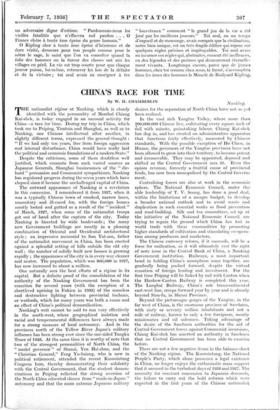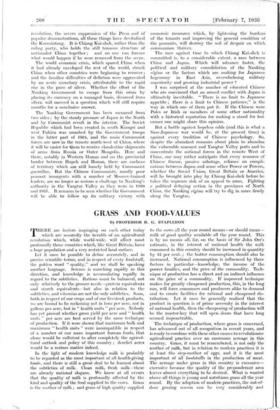CIIINA'S RACE FOR TIME
By w. THE nationalist regime at Nanking, which is closely identified with the personality of Marshal Chiang Kai-shek, is today engaged in an unusual activity for China—a race for time. During my trip in China, which took me to Peiping, Tientsin and Shanghai, as well as to Nanking, one Chinese intellectual after another, in slightly different terms, expressed the general thought : " If we had only ten years, free from foreign aggression and internal disturbance, China would have really laid the political and economic foundations of a modern State."
Despite the criticisms, some of them doubtless well justified, which emanate from such varied sources as Japanese Generals, Shanghai businessmen of the " die- hard " persuasion and Communist sympathisers, Nanking has registered progress during the seven years which have elapsed since it became the unchallenged capital of China.
The outward appearance of Nanking is a revelation in this connexion. I remembered it from 1927, when it was a typically Chinese town of crooked, narrow lanes, unsanitary and ill-cared for, with the foreign houses mostly looted and gutted as a result of the " incident " of March, 1927, when some of the nationalist troops got out of hand after the capture of the city. Today Nanking is bisected by wide boulevards ; the many new Government buildings are mostly in a pleasing combination of Oriental and Occidental architectural style ; an impressive memorial to Sun Yat-sen, father of the nationalist movement in China, has been erected against a splendid setting of hills outside the old city wall ; the number of solidly built new houses is growing rapidly ; the appearance of the city is in every way cleaner and neater. The population, which was 860,000 in 1927, has now increased to about' a million.
One naturally sees the best efforts of a regime in its capital. But a definite proof of the consolidation of the authority of the Nanking Government has been the cessation for several years (with the exception of a shortlived uprising in Fukien in 1933) of the senseless and destructive fighting between provincial tuchuns, or wSrlords, which for many years was both a cause and an effect of China's political demoralisation.
Nanking's writ cannot be said to run very effectively in the south-west, where geographical isolation and racial and temperamental differences have always made for a. strong measure of local autonomy. And in the pkovinces north of the Yellow River Japan's military influence has been strong ever since the one-sided Tangku Truce Of 1988.. At the same time it is worthy of note that two of the strongest personalities of North China, the " model governor " of Shansi, Yen Hsi-shan, and . the " Christian General," Feng Yu-hsiang, who is now in political retirement, attended the recent Kuomintang Congress here, thereby demonstriting their solidarity with the Central Government, that the student demon- strations in Peiping reflected the strong aversion of the North China educated classes from " made-in-Japan " autonomy and that the more extreme Japanese military desires for the separation of North China have not as yet been realised..
In the vast rich Yangtze Valley, where more than 200,000,000 Chinese live, cultivating every square inch of soil with minute, painstaking labour, Chiang Kai-shek has dug in, and has created an administrative apparatus that functions fairly effectively, measured by Chinese standards, With the possible exception of Ho Chien, in Hunan, the governors of the Yangtze provinces have not been allowed to grow into their territory, to become potent and irremovable. They may. be appointed, deposed and shifted as the Central Government sees fit. Even the opium revenue, formerly a fruitful cause of provincial feuds, has now been monopolised by the Central Govern, ment.
Centralising forces are also at work in the economic sphere. The National Economic Council, under the able leadership of T. V. Soong, has done a good deal, within the limitations of a meagre budget, to develop, a broader national outlook and to avoid waste and duplication in such essential works as flood prevention and road-building. Silk and tea committees, set up at the initiative of the National Economic Council, are trying to regain the ground which China has lost in world trade with these commodities by promoting higher standards of cultivation and stimulating co-opera- tion among producers and marketers.
The Chinese currency reform, if it succeeds, will be a force for unification, as it will ultimately vest the right of note issue in the Central Bank of China, a Nanking Government institution. Railways, a most important bond in holding China's amorphous mass together, are gradually being pushed forward, despite the virtual cessation of foreign lending and investment. For the first time Peiping will be linked by rail with Canton when the Hankow-Canton Railway is completed this year. The Lunghai Railway, China's sole transcontinental east-west line, creeps forward year by year and is already beyond Sian-fu, in Shensi Province.
Beyond the picturesque gorges of the Yangtze, in the far west of China, is the enormous province of Szechuen, with sixty or seventy million inhabitants and not a mile of railway, known to only a few foreigners, mostly missionaries and oil salesmen. Taking advantage of the desire of the Szechuen authorities for the aid of Central Government forces against Communist incursions, Chiang Kai-shek has asserted an- authority in Szechuen that no Central. Government has been able to exercise before.
There are not a few negative items in the balance-sheet of the Nanking regime. The Kuomintang, the NatiOnal People's Party, which alone possesses a legal existence in China, no longer enjoys the enthusiastic mass support that it aroused in the turbulent days of 1926 and 1927. The necessity for constant concession to Japanese demands, the failure to • carry out the bold reforms which were expected in the first years of the Chinese nationalist revolution, the severe suppression of the Press and of. popular demonstrations, all these things have devitalised the Kuomintang. It is Chiang Kai-shek, rather than the ruling party, who holds the still tenuous structure of nationalist China together ; and no one can foresee what would happen if he were removed from the scene.
The world economic crisis, which spared China when it had already enveloped the rest of the world, struck China when other countries were beginning to recover ; and the familiar difficulties of deflation were aggravated by an acute monetary crisis, attributable to the rapid rise in the price of silver. 'Whether the effort of the Nanking Government to escape from this crisis by placing its currency on a managed basis, divorced from silver, will succeed is a question which will still require months for a conclusive answer.
The Nanking Government has been menaced from two sides : by the steady pressure of Japan in the North and by Communist revolt in the interior. The Soviet Republic which bad been created in south Kiangsi. and west Fukien was smashed by the Government troops in the latter part of 1934, and the main Communist forces are now in the remote north-west of China, where it will be easier for them to receive clandestine shipments of arms from Russia or Outer Mongolia. Here and there, notably in Western Hunan and on the provincial border between Hupeh and Honan, there are enclaves of territory which are still loosely held by Communist guerrillas. But the Chinese Communists, mostly poor peasant insurgents with a number of Moscow-trained leaders, are no longer as serious a challenge to Nanking's authority in the Yangtze Valley as they were in 1930 and 1931. It remains to be seen whether the Government will be able to follow up its military victory with economic measures which, by lightening the burdens of the tenants and improving the general condition of the peasants, will destroy the soil of despair on which communism thrives. • The race against time to which Chiang Kai-shek is committed is, to a considerable extent, a race between' China and Japan. Which will advance faster, the political and military consolidation of the Nanking, regime or the factors which are making for Japanese hegemony in East Asia, overwhelming military superiority and growing industrial power ?
I was surprised at the number of educated Chinese who arc convinced that an armed conflict with Japan is ultimately inevitable. " There is no limit to Japanese appetite ; there is a limit to Chinese patience," is the way in which one of them put it. If the Chinese were Poles or Irish or members of some other nationality with a historical reputation for making a stand for lost causes one might share this opinion.
But a battle against hopeless odds (and this is what a Sino-Japanese war would be, at the present time) is. against every tradition of Chinese psychology. So, despite the abundant rumours about plans to abandon the vulnerable seacoast, and Yangtze Valley ports and to concentrate the national forces in the remote West of China, one may rather anticipate that every resource of Chinese finesse, passive sabotage, reliance on compli- cations between Japan and some other Power or Powers, whether the Soviet Union, Great Britain or Americh, will be brought into play by Chiang Kai-shek before he takes the supreme risk of an appeal to arms. Fighting a political delaying action in the provinces of North China, the Nanking regime will try to dig in more firmly along the Yangtze.















































 Previous page
Previous page